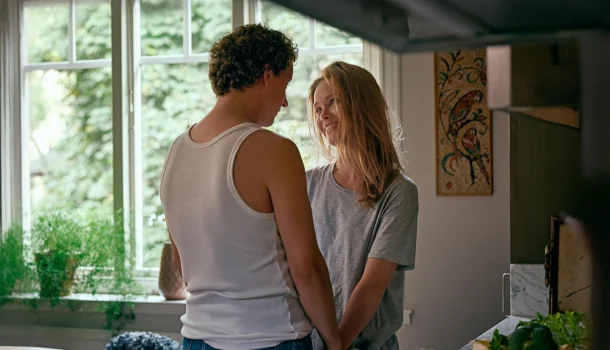Not every decision made by two people stems from firm conviction; often, it is born out of despair disguised as hope. Some relationships, quietly wounded, turn to temporary breaks or theatrical gestures as a way to breathe through impasse — a clumsy attempt to mimic spontaneity when the erosion is already scripted. For many couples, reviving the thrill of the beginning becomes a melancholic ritual: a flight in search of re-enacting what no longer holds, while burying deep the structural fractures that desperately call for confrontation. Love, when turned into a minefield, tends to wear the mask of a harmless game — until someone steps in the wrong place. “Love Forever” thrives on this fragile terrain.
Behind any recurring tension often lies a dense emotional mechanism, its gears jammed at unnamed junctions of the past. And what remains unnamed doesn’t vanish — it merely shifts shape. When only one partner commits to clearing the rubble, the effort becomes a monologue dressed as joint intention. It’s precisely in this landscape of delayed frustrations and poorly mended reconciliations that the story of Hanna and Samuel unfolds. To the outsider, “Love Forever” may initially resemble a culture-specific comedy of manners tinged with Nordic eccentricity. But the bittersweet tone crafted by Staffan Lindberg quickly reveals universal dynamics — the kind that seem absurd until you recognize yourself in them.
The narrative opens with a symbolic event: a wedding soon to take place on the island of Gotland, where the couple hopes to stage more than a ceremony — perhaps a kind of reset. The scenery is idyllic; the familial climate, anything but. As they involve their parents in the arrangements, old discomforts — softened by time and distance — resurface. Reactions oscillate between disbelief thinly veiled as support and excitement that quickly morphs into subtle confrontation. Hanna’s father is resigned to what he doesn’t quite grasp. Samuel’s mother, MajGun, embodies a quiet antagonism cloaked in tradition, enforcing her views with syrup-coated control.
Babben Larsson’s portrayal is both absurd and eerily credible. She doesn’t yell or command — she suggests, implies, and demands with the tone of someone doing you a favor. Her fixation on the national costume — supposedly a symbol of identity — becomes a sharp metaphor for how certain family codes cloak domination in the guise of heritage. In “Love Forever”, the couple finds themselves caught in a choreography of compromise that owes more to emotional self-preservation than affection. What was meant to be a celebration of intimacy gradually turns into a battleground of unspoken hierarchies and expectations.
Lindberg’s greatest strength lies in his refusal to surrender to moral binaries. His lens isn’t cynical, nor does it indulge in sentimentality. He allows Hanna and Samuel to gain complexity through their stumbles and hesitations. The audience, pulled in by the dysfunctional comedy of “Love Forever”, slowly realizes it’s not laughing at caricatures, but at magnified fragments of universal truths: the fear of disappointing our parents, the compulsion to please, the instinct to retreat when confronted. There are no clear antagonists, only uncomfortable zones that become unbearable when left unspoken.
Even the narrative stumbles — particularly the uneven rhythm of the second act — are softened by the visual density Erik Nordlund lends the film. His cinematography bathes each scene in a blend of freshness and unease, as though the characters are always one emotional step behind themselves. What could have become a predictable romance finds unexpected resonance not by subverting formula, but by revealing just how brittle such formulas are when forced to contain the raw complexity of intimacy.
In the end, “Love Forever” doesn’t offer closure dressed as revelation. Its power lies in the very decision not to resolve everything neatly. The film embraces discomfort and ambiguity as truer mirrors of life — and in doing so, it finds its deepest note. Perhaps the most liberating idea it offers is that, even amid the solemnity of a union, the most honest response might be admitting that no one truly knows what they’re doing. And yet, choosing to go on anyway.
Film: Love Forever
Director: Staffan Lindberg
Year: 2025
Genres: Comedy/Romance
Rating: 8/10

